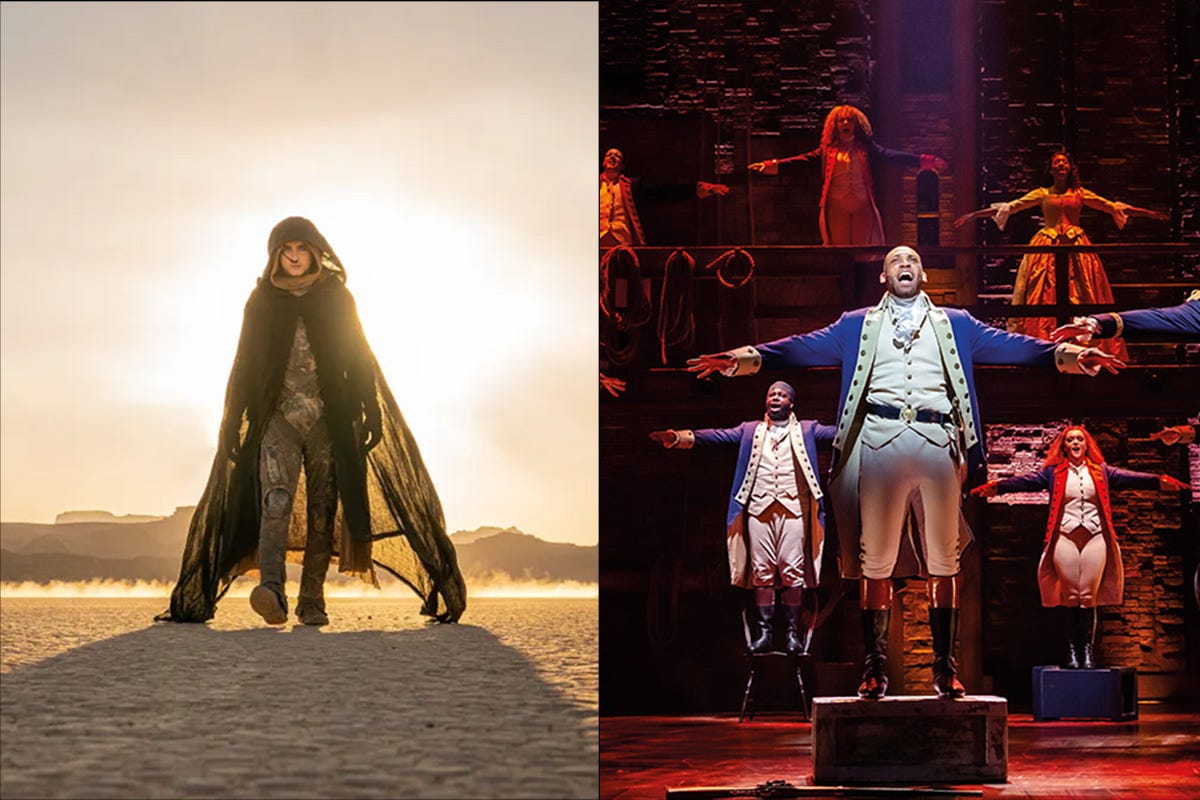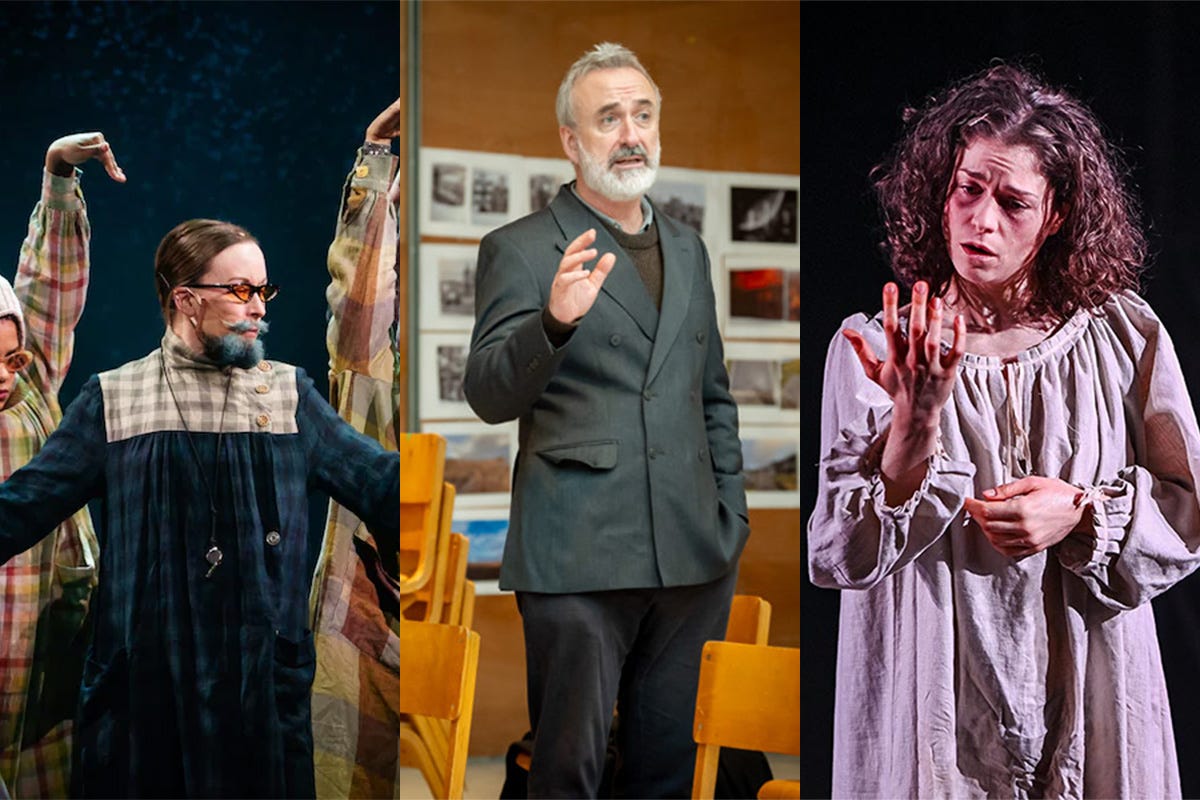Sorry, I'd rather pay £9.99 to see Dune: Part Two than £99.50 to see Hamilton.
I know it is very, very wrong to reduce art to numbers, but I am going to do it anyway to make a point about affordability, access and big worms. Plus: three shows to see next week.
Hello, and welcome to The Crush Bar, a newsletter about theatre written by Fergus Morgan.
This is the free, Friday issue, which usually contains a Q&A with an exciting theatremaker or an essay on an theatre-related topic - this week, there is a facetious bit from me about Dune: Part Two and Hamilton, value for money, Theatre Tax Relief, affordability, accessibility, and big worms. After that, there are your usual recommendations for shows to see next week.
In case you missed it, below is Tuesday’s issue of Shouts And Murmurs, which is a weekly round-up of the most interesting reviews, interviews and other articles on theatre elsewhere. Substack has just informed me that free subscribers can now unlock one paywalled article through the Substack app to see what they are missing, should they feel so inclined.
You can get Shouts And Murmurs straight in your inbox every week by signing up as a paid supporter of The Crush Bar for £5/month or £50/year. If you don’t feel like paying but still want to get the newsletter, then just reply to this email saying so, and I will make that happen.
There are a couple more things you can do to support this newsletter: you can share it with anyone you think might enjoy it and encourage them to subscribe, and you can use it for promotional purposes. There is more info about that here. Right, on with the issue…

On Monday evening, I went to see Dune: Part Two. On Tuesday evening, I went to see Hamilton, which has just made its Scottish premiere at Edinburgh’s Festival Theatre.
It is obviously ridiculous to compare the two on pretty much any level: one is a $190-million blockbuster about big worms, the other is an epic rap battle of history – remember them? – about America’s ten-dollar-founding-father-without-a-father.
There is one metric in which I think you can compare them, though: value for money. Regular readers of this newsletter will know that the priciness of commercial theatre is a big frustration of mine, as it is for lots of people. That is why I use every occasion a producer charges an eye-watering amount for a ticket to recommend some alternative theatre plans for the same cost. And that is why I am going to do some cynical sums for the next few paragraphs. (Please do not unsubscribe here: I know you can’t reduce art to numbers, I’m just facetiously attempting to illustrate a point.)
I paid £9.99 to see Dune: Part Two: that’s right, I forked out for a premium, recliner seat at Vue. I didn’t pay anything to see Hamilton, thanks to the lovely people at the Capital Theatres’ press office, but I have just checked how much that seat would have cost me: E18 in the dress circle would have set me back a wince-inducing £99.50.
Which did I enjoy more, as an audience experience? That is a tough one. I’m going out on a limb here, but I thought Hamilton was pretty good, guys. Yes, it is a bit long, the first half is far superior to the second, and the whole thing has a kind-of cringey, cool-history-teacher vibe that has not aged particularly well, but it is technically astonishing, and the touring cast – including lead Shaq Taylor, who I interviewed in The Stage last week – is brilliant. But, then, it had no worms in it, whereas Dune: Part Two had some really, really big ones. It’s too close to call: I’ll give them both five.
There are other factors to consider when contemplating the value for money of an experience, though, beyond the cost and the enjoyment of an experience. There is educational value (did it teach you anything?), there is spiritual value (did it make you a better person?), there is aesthetic/social value (did you get a good photo for your Instagram?), and there is a scarcity value (I can and will go see Dune: Part Two again, but the Scottish premiere of Hamilton is a one-time thing). There is also the fact that theatre is live performance and therefore has some kind of indefinable goodness. Let’s wrap all that up into one and call it the x-factor. Dune: Part Two: 3/5. Hamilton: 5/5.
Time for some maths. You can use this formula to generate a value for money metric for anything, from sci-fi movies to sung-through musicals to reading this newsletter:
So, Dune: Part Two is (5 x 3)/9.99, which equals 1.5. Hamilton is (5 x 5)/99.50, which equals 0.25. According to my calculation then, Dune: Part Two offers better value for money. You can set your own bar for an experience to clear: the tighter you are, the lower it will be; the flusher you are, the higher it will be. Mine is probably about 1. Dune: Part Two passes the test. Hamilton fails it. Even if I chose the most expensive cinema ticket in Edinburgh (£17.65 in the fancy Everyman where you can get a G&T brought to your seat) and the cheapest theatre ticket (£30), Dune: Part Two still wins.
Obviously, everyone’s employment of this formula would be unique: you will set your bar at a different level, you will value the various aspects of an experience differently to me, and you might not be as big a fan of enormous invertebrates. And nerds will be able to tell me why it doesn’t make sense and theatre people will, quite rightly, object to a philistine exercise in reducing art to numbers. That is missing the point, though.
The point is one you have heard countless times before: theatre has a serious affordability problem, particularly in the commercial sector and particularly compared to other artforms. Of course, I understand that making theatre is a tricky business and touring large-scale shows an even trickier one. I appreciate that it has to cost more to exist. But times are tight, rents are rising, and the cost of a cappuccino is approaching £4 - and you expect me to shell out £100 to see a musical when I could spend a tenth of that on seeing some ginormous annelids? In questa economia?
I will not detail the knock-on effects of this problem because you already know them: a lack of affordability means a lack of access, which means a lack of diversity, which means the death of an artform. It means theatre going the way of opera and ballet. Yes, it is that serious. But is the industry serious about solving it? I’m not convinced.
I will end by juxtaposing two pieces of news, both of which emerged on Wednesday. Firstly, a YouGov survey found that the cost of tickets is the main reason people are put off going to the theatre: 77 per-cent of people in the UK are “generally willing” to go to the theatre, apparently, but only 31 per-cent actually did in the last year, and 57 per-cent – 67 per-cent in London – said that was chiefly because of how expensive it is.
Secondly, the chancellor Jeremy Hunt announced that Theatre Tax Relief would stay at 45% for touring productions like Hamilton and 40% for non-touring shows. Not one of the many voices hailing the financial relief this will bring – Cameron Mackintosh, Nica Burns, and Baron Harkonnen Andrew Lloyd Webber among them – mentioned reducing ticket prices, though. Not one. Hmm. Those big worms are hungry…
Three shows to see next week
Blue Beard - various, until May 18
Emma Rice’s imaginative adaptation of this French folktale about a man who murders his wives opened in Bath in February to rave reviews and is currently in the middle of a national tour: York Theatre Royal until tomorrow, then the Edinburgh Lyceum until the end of March, then Birmingham, then London. Produced by Rice’s company Wise Children, it wackily reimagines the titular wife-killer as a sinister magician, wittily works in references ranging from Quentin Tarantino to Jamie Oliver, and has a sharp sting in the tale. You can read Rosemary Waugh’s five-star review in The Stage here, listen to an interview with Rice here, and get tickets for it via the button below.
Faith Healer - Lyric Hammersmith, until April 13
Brian Friel’s timeless play about the life of Irish faith healer Francis Hardy was first produced in 1979 and has been regularly revived ever since. The latest staging comes from Rachel O’Riordan and stars Declan Conlon, Nick Holder and Justine Mitchell. You’ll be able to read my interview with Mitchell in The Stage soon and you can book tickets for its month-long run at London’s Lyric Hammersmith via the button below.
Macbeth - Leeds Playhouse, until March 23
Director Amy Leach’s staging of Shakespeare’s Scottish play was first performed at Leeds Playhouse in 2022, when it garnered some great reviews. The Guardian’s Catherine Love called it “thriller-like and almost cinematic” in her four-star write-up, while The Stage’s Natasha Tripney called it “propulsive but emotionally grounded” in hers. It now returns for a three-week run, with Jessica Baglow reprising her performance as Lady M and Ash Hunter stepping into Tachia Newall’s shoes as the titular King of Scotland. You can get tickets via the button below.
That’s all for this issue
That is it for this week. If you want to get in touch about anything raised in this issue - or anything at all, really - just reply to this newsletter or email me at fergusmorgan@hotmail.co.uk. Or you can find me on Twitter/X, where I am @FergusMorgan.
A quick reminder of the ways you can support The Crush Bar. You can share it. You can use it for promotional purposes. And you can become a paid supporter, which means you get an extra weekly email, Shouts and Murmurs, every Tuesday. There are currently 2673 subscribers, 70 of whom are currently paid supporters. If you would like to join them, you can do so above.
Fergus






On the Dune vs Hamilton - and no-one mentioned (including you) that government funding (which is not the same as tax relief, for the avoidance of doubt) for the arts is being radically cut at local levels because of lack of funding from central government which some might interpret as deliberate defunding of a sector which is the most critical of government. Now work out a formula for that one :-)